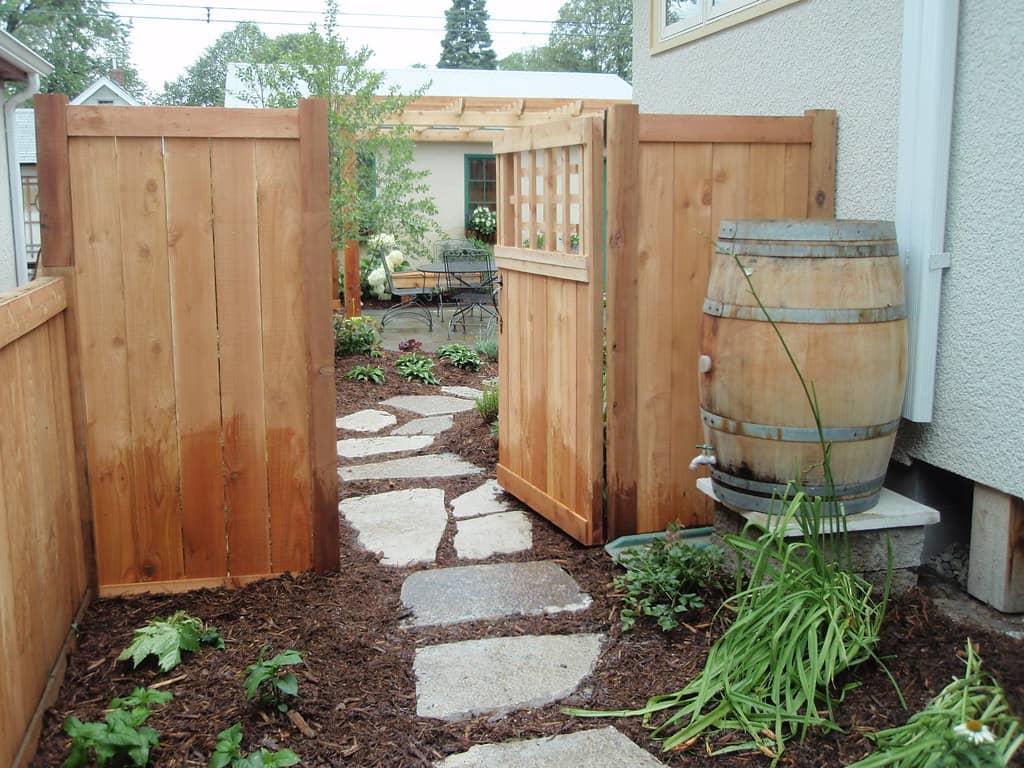Rain barrels are a great way to conserve water by using the rainwater that runs off of your roof. Often there is a significant amount of rain in the summer; rain barrels can protect your foundation and provide water that can be used to water your plants and trees or wash your car. Without treatment, this water is not potable — meaning it should not be used for drinking water. As a result, you may be wondering if rain barrel water is safe for vegetable gardens. I’m happy to report that it is! But there are some caveats you should be aware of. Read on, and let’s explore the topic together.
Psst
We wrote an entire rain barrel buying guide for 2020. If you’re in the market, consider giving it a read!
Making Rain Barrel Water Safe For Vegetable Gardens
It has long been cautioned that people should not use water collected in a rain barrel for drinking water or for watering plants that you plan to eat. Why the warning? The reason is that the barrel may contain bacteria or unwanted chemicals that combine with the water as it runs off the roof.
However, as water shortages have become more common and people look for more ways to conserve much-needed H2O, it’s important that we re-evaluate these opinions. Luckily, research and experimentation has led to finding many ways to make it safe to use rain barrel water for vegetable gardens.
Prepare Your Rain Barrel
The first step is to prepare your rain barrel ahead of time if you plan to use it to water your vegetable garden. Make sure that you empty the rain barrel first and clean it with a bleach solution. You can use three percent bleach with water to clean and rinse the rain barrel.
By using bleach, you will kill any bacteria in the rain barrel. Once you have cleaned it, you will want to add a cup of bleach every month to make sure that it stays free of bacteria. When you add bleach, you need to make sure that you do not use the rainwater from the rain barrel for at least 24 hours so that the bleach has an opportunity to be integrated into the water that has collected.
Research Your Roof Materials
The materials that your roof is made of can impact how safe your rainwater will be for watering a vegetable garden. Roof materials can contain unwanted chemicals such as zinc and lead. Additionally, mold/mildew/moss can grow on the shingles themselves. The best way to find out is to have the rainwater in your rain barrel tested. Although it may contain some of these pathogens, it may be low enough that it will not affect the safety of using it in your vegetable garden.
Many roofs have asphalt shingles and these roofs have been tested. The results show that the pathogens present are lower than the recommended standards set by the U.S. Environmental Protection Agency (US EPA), and there is very low risk of contamination to vegetable gardens.
Test Your Rainwater
If you are going to use the rainwater from your rain barrel to water your vegetable garden, it is very important to perform testing periodically. In addition, some municipalities actually require testing if you plan to use the rainwater on edible plants. When this is required, you can obtain a sampling bottle from a laboratory to collect the water and take it to them for testing.
The primary bacteria that you are testing for is E. coli. It is extremely important that you ensure that your rainwater is not contaminated with E. coli before you use it for your vegetable garden because it can make you and anyone else who eats the vegetables from the garden very sick.
Maintain Your Rain Barrel
The first thing you need to do is to make sure that you keep your gutters cleaned out. Leaves and debris will collect in them and you need to make sure that you regularly clean them out. You can add a gutter cover, which is a screen mesh, and it will help to prevent your gutters from getting clogged.
You should also make sure that you have a screen or a metal flap installed over the top of your rain barrel. This will cut down on the mosquitoes as well as prevent leaves and other debris from accumulating in your rain barrel.
It is important to empty your rain barrel regularly. You do not want it to overflow. There is often a spigot where you can release some of the water and this will help to lower the water level if you aren’t ready to use it. You should avoid letting water sit for too long as it will become a breeding ground for algae, bacteria, and other contaminants.
Assuming you have a full barrel, you can add a cup of bleach every month to help prevent bacteria and algae from forming. In addition, make sure that you thoroughly clean your rain barrel when you winterize it. You will need to disconnect and store your rain barrel before the first frost. This is a great opportunity to clean it.
When you set your rain barrel up again in the spring, you should do another cleaning with bleach. Make sure that you rinse it thoroughly and let it dry before you hook it up and start collecting water.
How To Water Your Vegetable Garden
First, you need to make sure that you have cleaned the rain barrel with the technique mentioned above. Once it has been cleaned and is dry, the next step is preparing to water your vegetable garden. You can use a watering can or a hose that is set to have the water come out slowly.
You should never water the leaves or the plants directly. It is best to water the soil around the vegetables in the garden. It is important to make sure that the water is never applied directly on the plants. In addition, you should always use this water to water your vegetable garden in the morning because the ultraviolet light from the sun will help to disinfect any contaminants in the rainwater and the leaves will be able to dry if they do get wet.
Rain Barrel Advantages
Besides the fact that rain barrels prevent water from accumulating near your foundation where it can seep into your basement, they collect water that can be used to water your lawn, plants, and trees. In the summer, lawn and gardening account for almost 40 percent of water use in a household. This translates to huge savings on your water and utility bills.
Final Thoughts
You can use the rainwater in your rain barrel for your vegetable garden as long as you follow the above precautions. The most important thing is to make sure that the water remains safe and free of dangerous contaminants. Take care to clean the rain barrel thoroughly once a year and maintain it throughout the summer so that it doesn’t become unsafe for watering your vegetable garden.

